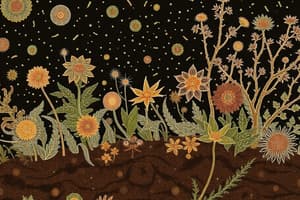Podcast
Questions and Answers
What is soil microbiology concerned with?
What is soil microbiology concerned with?
Soil-inhabiting microorganisms, their functions, and activities.
Which layer of soil is mainly composed of organic materials?
Which layer of soil is mainly composed of organic materials?
- O horizon (correct)
- B horizon
- C horizon
- A horizon
Which horizon is known as the zone of accumulation?
Which horizon is known as the zone of accumulation?
- O horizon
- A horizon
- C horizon
- B horizon (correct)
The C horizon is the most influenced by soil-forming processes.
The C horizon is the most influenced by soil-forming processes.
What is soil texture?
What is soil texture?
Which type of soil is considered the poorest for agriculture?
Which type of soil is considered the poorest for agriculture?
What are the soil particle size ranges for sand?
What are the soil particle size ranges for sand?
The soil horizon characterized by light color and more clay than the A horizon is called the ______.
The soil horizon characterized by light color and more clay than the A horizon is called the ______.
Match the following types of soil with their characteristics:
Match the following types of soil with their characteristics:
Flashcards are hidden until you start studying
Study Notes
Soil Microbiology
- Soil microbiology is the study of microorganisms within soil, their functions, and their activities.
- Soil is a key natural resource essential for life on Earth.
Soil Formation
- Soil is formed by the interaction of five factors:
- Topography
- Organisms
- Climate
- Parent material
- Time
Soil Profile
- A soil profile represents a vertical cross-section of soil layers, known as horizons.
- Each horizon has distinct features.
- Horizons are labeled: O, A, E, C, B, and R.
Soil Horizons
- O Horizon (Topsoil): Composed of organic matter like leaves, grasses, and decomposed material.
- A Horizon (Topsoil): Mineral horizon with accumulated organic matter, rich in nutrients, darker color, high in sand and lower in clay.
- B Horizon (Subsoil): Zone of accumulation where substances like iron and aluminum leach from the A horizon. Illuviation occurs here.
- C Horizon (Parent Soil): Less affected by soil-forming processes, lacks organic matter and microbial activity.
- R Horizon (Rocky Bed): Underlying bedrock, like limestone or sandstone, found beneath the C horizon.
Soil Properties
- Soil texture and structure influence soil behavior:
- Water holding capacity
- Nutrient retention and supply
- Drainage
- Nutrient leaching
- Soil texture is determined by the proportion of sand, silt, and clay particles.
Soil Texture Table
| Particle Type | Size Range (mm) |
|---|---|
| Sand | 0.05 to 2.0 |
| Silt | 0.002 to 0.05 |
| Clay | Less than 0.002 |
Soil Texture Impact
- Soil texture influences plant growth characteristics:
- Water-holding capacity
- Permeability
- Soil workability
Soil Types
- Sandy Soil: Large particle size, poor water retention, low nutrient value.
- Silt Soil: Smaller particles than sand, holds water better than sand, more fertile than other soils.
- Clay Soil: Smallest particles, densely packed, retains water well, hinders moisture and air penetration.
- Loamy Soil: Mixture of sand, silt, and clay, combines beneficial properties from each, suitable for plant growth.
Studying That Suits You
Use AI to generate personalized quizzes and flashcards to suit your learning preferences.




